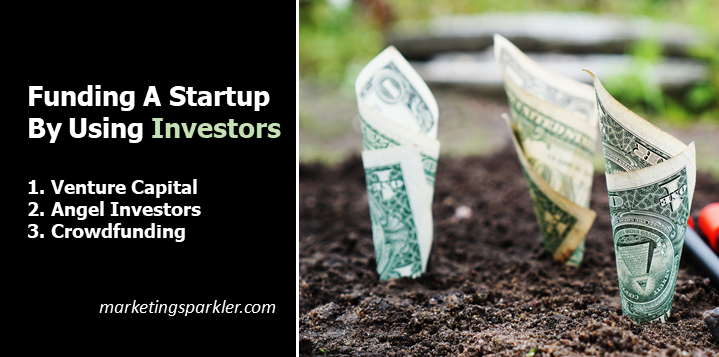There can be quite a few upfront costs to consider when starting a business, ranging from buying equipment to launching a website. There are three main ways in which you can cover these costs: you can use your own money, borrow money or get money from investors.
But how should you fund your startup? Each form of funding has its own benefits and drawbacks that are worth considering. There are also multiple ways of approaching each form of funding. This guide delves into the different ways of seeking funding – and how you can tell which one is right for you.
Save, Borrow Or Use Investors: How Should You Fund Your Startup?
Funding A Startup With Savings
There are lots of advantages to using your own money to start a business. The main advantage is that you don’t owe anyone anything else – without having to pay loan repayments or shares, you can maximize your future profits. You can also feel proud knowing that it’s your money that you’ve poured into the business. On top of this, it could encourage you to spend your money more carefully.
It’s possible that you may already have savings lying around in an account. This could allow you to get stuck into starting your business straight away.
If you’re not lucky enough to already have savings, you’ll have to think of ways to start accumulating savings. This could include selling items for cash or slowly making contributions from earnings. It’s worth setting up a high-interest savings account that will generate extra earnings on top of your contributions. Your local bank may even have special business savings accounts for helping to launch a startup.
When it comes to businesses with large startup costs, it could take several months or even several years to save up the required funds yourself. This may not be ideal if you’re eager to launch your business straight away. In some cases, you may even miss opportunities by choosing to save up and wait. In these situations, you could be better off seeking out another form of funding.
In all cases, you should try to use some of your own money to fund your startup. This could reduce the debts and shares that you have to pay out in the future. A lot of lenders and investors may also be more willing to provide funding knowing that you’ve put some of your own money in too.
Funding A Startup By Borrowing
A lot of people take out a loan when starting a business. If you haven’t got savings, a loan is often the fastest way to access the money you need. It can also require less work than seeking help from investors.
That said, there are drawbacks to borrowing. You have to pay back everything you borrow with interest on top, making it potentially expensive in the long run. Getting approved by a lender also isn’t easy for everyone – if you have a poor credit score, you may be rejected by most lenders. Some lenders may also require you to show them a business plan first.
The cost of your loan, the loan requirements and the time it takes to receive your loan are likely to depend entirely on which types of lender you use. There are a few different loan options that you can consider.
Bank loans
Banks tend to offer relatively low interest rates. They may also be willing to lend out much larger amounts than other lenders. This can make them a good choice for many budding business owners. These loans can be some of the hardest to get approved however – you generally need a good credit score and you’ll need a solid business plan.
Private loans
Private lenders include any loan company that isn’t a bank. Some of these lenders will behave much like banks offering large amounts with low interest rates, but requiring good credit scores and a good business plan. Other private lenders may be more willing to approve those with low credit scores and may not require you to provide a business plan, however they may not be willing to lend as much and may charge high interest fees. Be wary of falling victim to high interest fees.
Peer-to-peer lending
Peer-to-peer lending is a modern form of online borrowing in which any member of the public is able to act as a lender. Business owners wanting to borrow money can use online peer-to-peer platforms to connect with willing lenders. Lenders on these platforms typically charge less interest than banks or loan companies and may be more willing to lend to those with a poor credit score, although you’ll likely need to have a clear business plan. Peer-to-peer lending is constantly evolving as an industry with blockchain technology helping to create a more secure DeFi approach (DeFi is short for decentralized finance in which no banks or intermediaries are involved). There are even crowdfunding peer-to-peer lending platforms in which you can borrow a loan from multiple different lenders.
Loans from friends/family members
You can also fund your startup by borrowing money from family or friends. Most friends and family members won’t charge interest and they may allow you to pay back the loan more flexibly. Just make sure that you do pay back the loan and don’t treat it as free money – as this could cause friction between the two of you. You also need to trust that they won’t demand your money back earlier than agreed.
Funding A Startup By Using Investors
A company or individual may be willing to give you money to fund your business. In return, you may have to give them shares in future profits.
Seeking funding from investors may take a little longer than taking out a loan, but could still be much quicker than saving up money. You also don’t have to pay them anything until your business is making revenue. In some cases, you may also be able to benefit from professional advice as well as funding.
In order to secure investment, you’ll need to have a good business plan. In some cases, you may have to give a pitch. This could be daunting for some entrepreneurs.
There are several types of investor to consider.
Venture Capital Firms
Venture capital firms are businesses that specialize in pouring investment into other companies – usually startups or small companies looking to grow. Such businesses may be able to offer more funding than your average lender and may ask for reasonable shares in return. VC firms won’t invest in any company of course – you need to have a strong and detailed business plan in order to win them over and will likely have to give a pitch.
Angel Investors
Angel investors are wealthy individuals that are willing to invest money into local causes. Most angel investors won’t be willing to invest as much as a VC firm and may ask for greater shares in return. However, such investors may also be willing to work more closely with you, possibly offering support in launching your business if they are a successful entrepreneur themselves. As with VC firms, you’ll need a strong business plan and pitch.
Crowdfunding
Crowdfunding involves getting lots of different people to each invest small amounts until you reach your target fund. You could rely on people donating money or you could give out small shares in return. This can be a much slower means of seeking investment, but could possibly allow you to raise more money. Most people seek out crowdfunding through crowdfunding sites.
As you can gather, there are several options you may use to fund your startup. It’s important to understand that you don not have to wait before you have enough saved to launch. Explore some of the options presented above to get your ideas funded and launched!
Ciao,
Miss Kemya




